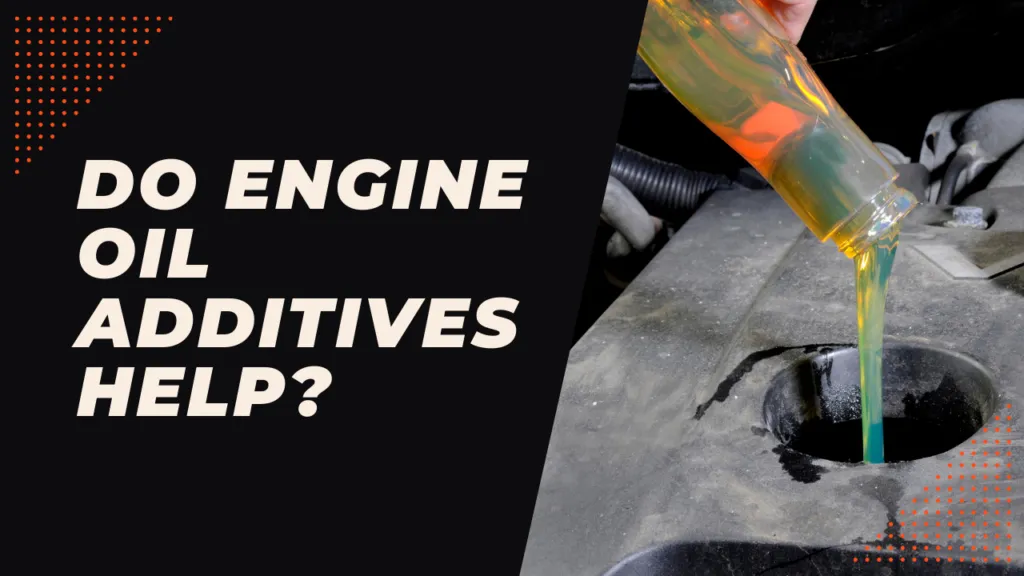
What do engine oil additives do?
Engine oil additives enhance the base properties of oil with antioxidants, emulsifying agents, corrosion inhibitors, anti-foam agents, and detergents. These are needed to ensure all internal moving parts of the motor get enough lubricant to operate effectively. Without proper lubrication, the engine’s metal components would not run properly.
What are the benefits of aftermarket oil additives?
- It will help you get the most out of your car’s motor.
- It can improve fuel efficiency by up to 5%.
- It can improve the performance of your car’s transmission.
- It can prevent premature engine wear.
Is there evidence that engine additives work?
Yes, there is a lot of evidence that shows engine additives do work. Many studies on this topic found they improved performance and protected the motor.
They help improve the lubrication system, reduce friction between moving parts, prevent rusting and corrosion, control combustion temperature, and increase the engine’s life span. Engine oil additives also help in reducing emissions.
Can motor oil additives damage the engine?
Engine oil additives help prevent increased wear and tear on internal engine components by lubricating them better than regular motor oils. However, adding too much oil additive will cause the oil to become thick and heavy. It also increases the chances of corrosion, leading to the overloading of internal components. To avoid this problem, make sure you follow the recommended amount on the label.
What are the types of oil additives available?
Multiple types of additives are available to improve fuel economy, help with engine performance, lower the overall operating temperature, and protect parts from wearing out too quickly. The seven most commonly used aftermarket engine oil additives are listed below.
Anti-wear additives:
Anti-wear engine oil additives keep the motor free of metal particles by reducing metal contact. It also stops sludge build-up from forming. In addition, anti-wear additives prevent internal motor parts from wearing out too quickly, which is vital because worn engines cause higher fuel consumption, lower gas mileage, and engine seizure in worse cases.
Anti-freeze agent:
Anti-freeze additives keep the motor’s temperature cool by helping it run at a constant temperature to prevent overheating, which could cause the engine to lose power and eventually stop working altogether.
Lubricity enhancers:
These agents enhance the ability of the oil to flow smoothly through the engine. Lubricity enhancers are usually polymer lubricants with low viscosity, also used in automatic transmission fluids.
Viscosity index improvers:
Also referred to as viscosity modifiers, this helps increase the oil’s viscosity. Viscosity improvers consist of amines, esters, ethers, or alcohols. Amine-based products are preferred because they are less likely to break down under harsh conditions.
Corrosion inhibitors:
These agents prevent oxidation and rust formation. They consist of phosphates, silicates, boron compounds, and others.
Rust inhibitors:
These agents prevent rust formation. Rust inhibitors consist of organic acids, phenolic antioxidants, or alkyl phosphonic acid derivatives.
Antioxidants:
These agents prevent the degradation of the oil caused by heat and oxygen. Antioxidants consist of hindered phenols, hydroquinones, aromatic amines, or amides.
Anti-Foaming agents:
This agent helps prevent foaming and air bubbles in the oil.
Who makes oil additives?
Several companies manufacture oil additives, including Mobil Oil Corporation, Shell, Chevron, Texaco, and Phillips 66. However, even though several different manufacturers make additives, they all work similarly.
Steps for using additives
You don’t need to add any additives when using regular-grade motor oil. But if you want to get the best possible results, you’ll want to use a high-quality oil that contains additives such as anti-wear, anti-freeze, and corrosion inhibitors.
When adding additives to your oil, follow these six steps:
1. Pour the recommended amount of additive into the reservoir of the oil filter.
2. Let the oil sit for 10 minutes before starting the engine.
3. Start the engine and let it idle for 5 minutes.
4. Turn off the engine and wait 30 minutes before driving again.
5. Repeat this process every time you change the oil.
6. Change the oil after 3,000 miles or six months.
Other questions people asked
- How long does it take for oil additives to work? It takes about 30 minutes for the additive to start working. Add the additive when you first fill up the oil for best results.
- How often should I use engine oil additives? The amount you need depends on how often you drive your vehicle. Most vehicles require about 1 ounce of additives per quart of oil. However, some vehicles require more than that. Check your owner’s manual for the suggested amount.
- How do oil additives serve to prolong the motor’s life? These additives work by adding certain chemicals to the oil. These chemicals react with the existing molecules in the oil to form new ones. As a result, the oil thickens and has a longer-lasting effect.
- What is the best additive for noisy lifters? Unfortunately, no single additive will make your engine run quieter. Instead, you have to find out why it’s making noise and then choose the suitable additive for that particular problem.
- Can oil additives be used to keep the internal engine parts clean? Yes, but only if you’re replacing the oil.
- Is it okay to mix different types of engine oils? Combining various kinds of engine oils won’t affect their performance. Incorporating them together could even improve the overall quality of your oil.
- Will oil additives stop knocking sounds from the motor? Unfortunately, no, but high-quality engine oil additives may help reduce the severity of the knocking sound or other engine noise.
- Is there a specific aftermarket oil additive for my car? No, but there are a few factors to consider when choosing an oil additive. These include the type of engine, the type of vehicle, and how long you plan to drive the car. Check the owner’s manual for specific details if you’re unsure which type to buy.
- Will adding an aftermarket oil additive void my warranty? Some oil additives may void your warranty, such as those containing anti-corrosive properties. However, if you purchase a quality product, you should not encounter any problems.
- Do diesel engines use a different oil additive than gasoline engines? Diesel engines don’t use the same kind of oil as gasoline engines. They use mineral oil instead of synthetic motor oils. Refer to your owner’s manual to determine which type of additive your vehicle should have.
- How do I know what type of oil additive to buy? If your vehicle has an oil filter, look for the manufacturer’s name stamped into the bottom of the filter. If there isn’t one, ask the dealer which type of additive to use. You can also check your car’s service manual, which may list the specific type.
- Does standard oil include additives? Most standard motor oils have approximately 15% additive content which should be sufficient for regular operation. However, if you use a high-performance or racing oil, it may contain more than 25% additive content.
- Can oil additives be used as fuel additives? Unfortunately, no. Oil additives extend the life of the oil by preventing oxidation, and a fuel additive prevents carbon deposits in the combustion chamber. The two products serve entirely different purposes.
- What are oil detergent additives? A detergent additive cleans and neutralizes impurities in the oil, preventing oil sludge on key components.
- How can oil additives help in a high mileage vehicle? Oil additives will keep your engine lubricant cleaner longer, thus extending its oil life which means that you’ll spend less money replacing your oil at intervals, and you’ll save time when changing your oil.
- Are oil additives suitable for new vehicles? Yes, oil additives will protect your motor during the first few thousand miles. After this, the benefits of using oil additives will diminish.
In conclusion, additives in motor oil are helpful because they prolong the engine’s life and keep it running smoothly. Although some people believe that using additives can damage the motor, this is not true. Many manufacturers recommend using them to prevent premature wear on the motor.
Auto Glass Locator provides auto glass services to customers nationwide and produces articles to help internet shoppers with automotive-related questions and concerns. If you found this article helpful, please share it with your friends!






